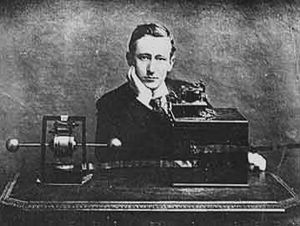Guglielmo Marconi
Guglielmo Marconi: Biography
<pageby nominor="false" comments="false"></pageby>;
Born: 25 April 1874
Died: 20 July 1937
Guglielmo Marconi was born in Italy in 1874 to Giuseppi and Annie Jameson Marconi. His father was a wealthy Italian landowner and his mother was from a wealthy Irish family. He was educated in both Italy and England and was fluent in many languages. Marconi was educated by private tutors at home and then spent several years at the Livorno Technical Institute after failing the entrance examinations for several Italian universities. After reading an article about electromagnetic, or radio, waves, he began thinking about building a device to transmit radio waves over long distances. He understood that this method of communication would be faster than telegraphy and less cumbersome because no wires would be involved.
Starting in 1894, his parents let him use the upper floor of their Bologna estate as a laboratory. Once Marconi duplicated Heinrich Hertz’s experiments and succeeded in sending signals over long distances, he offered his idea to the Italian government. They turned him down and he took his ideas and equipment to the English government who also refused to finance him. Marconi eventually raised money privately and established the Wireless Telegraph and Signal Company in London.
By 1899 Marconi was constructing wireless stations on both sides of the English Channel and in 1901 he installed transmitters powerful enough to send messages across the Atlantic. The following year he established a company in New York. He lived a transatlantic existence, working in both Europe and the United States.
Marconi was widely recognized for his work in his own time. In 1909 he was awarded the Nobel Prize in Physics. Grateful Titanic survivors presented him with a gold medal in recognition of his work in radio, which helped save their lives in the 1912 disaster.
Unlike many other radio pioneers, Marconi was a savvy businessman. He went to great lengths to control his own patents as well as those of others in the field. Only a variety of international agreements and patent pooling schemes prevented him from establishing a monopoly on the technology. These efforts notwithstanding, by 1912 the British-based Marconi Company essentially controlled the global wireless communications industry. This virtual monopoly led to corruption charges in the effort to build communications networks across Europe. The “Marconi Scandal,” although not ruinous, eventually ended Marconi and Britain’s chances of regaining global dominance of radio, leaving the door open for the fast-rising American telecommunications industry.
As befitting his international lifestyle, in 1919 Marconi took up residence on the yacht Elettra, which served as his main home and research laboratory. The Elettra, a state-of-the-art floating laboratory, became a common sight off the coast of Cornwall, England where Marconi continued experimenting with radio waves. He also hosted many parties aboard the yacht, with guests ranging from laboratory assistants to royalty.
In addition to his scientific and business interests, Marconi was eager to demonstrate his loyalty to his native country, despite the fact that he left Italy as a young man. He undertook many diplomatic missions as a representative of Italy.
Marconi died in 1937 The day after his death wireless operators all over the world shut down their transmitters for two minutes of global silence.
<rating comment="false"> Well Written? 1 (No) 2 3 4 5 (Yes) </rating> <rating comment="false"> Informative? 1 (No) 2 3 4 5 (Yes) </rating> <rating comment="false"> Accurate? 1 (No) 2 3 4 5 (Yes) </rating>
